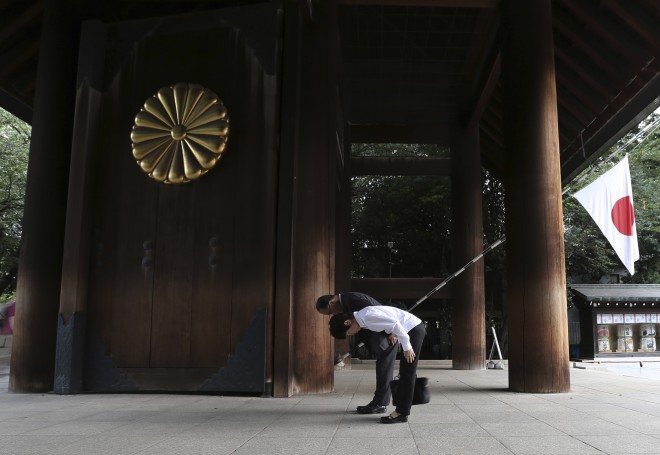Japan emperor offers ‘remorse’ on WWII surrender anniversary
TOKYO—Emperor Akihito expressed rare “deep remorse” over his country’s wartime actions in an address on Saturday marking the 70th anniversary of Japan’s World War II surrender, a day after the prime minister fell short of apologizing in his own words to the victims of Japanese aggression.
Prime Minister Shinzo Abe, meanwhile, stayed away from a contentious Yasukuni shrine that honors war criminals among other war dead. He instead prayed and laid flowers at a national cemetery for unnamed fallen soldiers ahead of the annual ceremony at Tokyo’s Budokan hall.
That ceremony started with a moment of silence at noon to mark the radio announcement by Emperor Hirohito, Akihito’s father, of Japan’s surrender on Aug. 15, 1945.
“Reflecting on our past and bearing in mind the feelings of deep remorse over the last war, I earnestly hope that the ravages of war will never be repeated,” Akihito said in his speech. Japanese media said it was the first time he had used the words “deep remorse” in reference to the war.
Article continues after this advertisementAkihito also emphasized that Japan’s peace and prosperity stand on “the people’s tireless endeavors and their earnest desire for peace,” and renewed his war-renouncing pledge.
Article continues after this advertisement
Visitors bow to pay respects to the war dead at Yasukuni Shrine in Tokyo Saturday, Aug. 15, 2015. Japan marked the 70th anniversary of the end of World War II. (AP Photo/Eugene Hoshiko)
Even though they are subtle and still rather neutral, remarks by the emperor on Japan’s wartime past in recent years have caught attention, often portrayed in the media to contrast Abe’s nationalist and hawkish image, especially as he pushes to give Japan’s military an expanded role and change Japan’s pacifist constitution.
On Friday, Abe issued a closely monitored statement on the eve of the anniversary, acknowledging damage and suffering on innocent people but falling short of apologizing in his own words to the victims of Japan’s aggression.
Abe donated Shinto-style religious ornaments for the shrine, as he has done in the past since his last visit in December 2013, which triggered uproar from China and South Korea. However, two of his Cabinet ministers prayed at the shrine, and a group of about 60 national lawmakers also visited Yasukuni.
The lawmakers say they merely want to pay respect to those who sacrificed their lives for their country. But because Yasukuni mostly enshrines soldiers, many see it as a symbol of Japan’s past militarism.